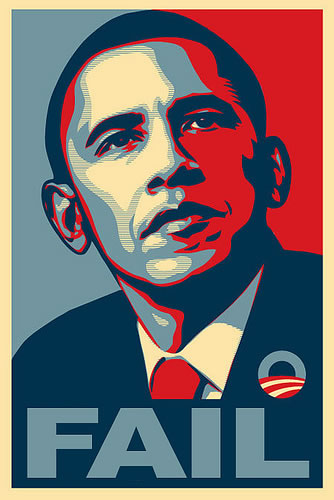Is Obama Smart? It’s a question that more and more people are asking. His devoted fans like to note that he made it through Columbia and Harvard–supposedly a stark contrast to Rick Perry’s less-than-stellar transcript from Texas A&M, though Obama’s refusal to release his own transcripts does blunt the comparison.
More to the point though, the evidence seems conflicting. On the one hand, he ran a remarkable campaign in 2008. He sensed what the American people needed to hear, and he emerged from nowhere to defeat vastly more qualified opponents. On the other hand, his performance as President has been dismal. Most Americans recognize that his policy preferences range from the irrelevant to the counterproductive, and leftists contend that he has been ineffectual in pursuit of their agenda.
So is Obama smart? Yes. Obama is a certain kind of smart. Unfortunately, it’s the wrong kind. President Obama is the sort of smart that our finest institutions recognize, promote, and reward. There is no surer path to academic success than learning the orthodoxy of your field and the particular bent of your professor; explaining why only those blessed with suitable experience, training, and insight can comprehend the complex problem under consideration; and then parroting the professor’s previously articulated answers shortly before he or she reveals them to the class. Mastery of this skill continues to pay dividends in the real world, most prominently among business consultants versed in telling corporate boards what they want to hear, and attorneys capable of tailoring their arguments to the predispositions of the judges before whom they appear.
It is unclear that these skills bear any relationship to problem solving acumen, but they do earn high grades, glowing recommendations, consistent promotions, and top dollars. They also perpetuate a self-congratulatory status quo by ensuring that the current generation of leaders selects successors whose uninspired, orthodox thinking most clearly mirrors their own, and who have little incentive and less ability to seek innovative solutions to challenging problems. Furthermore, the preference for such skills institutionalizes the idea that our challenges are so complex that only a trained priesthood can grasp them–much less address them. The central belief of our academic elite is: “Trust us. We’re smarter than you are.”
Only folks possessing this type of smart comprehend that every aspect of human existence is more complicated than it appears to be. Thus, for example, only they can see: How paying people not to work increases employment; How penalizing the successful motivates investment in productive ventures; How embarrassing allies motivates other nations to operate in America’s best interests; How apologizing for the spread of liberalization and democracy invigorates those fighting for their freedom; How kowtowing to dictators encourages them to reconsider the morality of their governance; How threatening uncertain regulation reassures businesses considering expansion; How partially nationalizing industries improves competitiveness; How favoring some racial or ethnic groups above others reduces discrimination; How diverting money from a productive private sector to a stagnant public sector improves productivity; How promoting union benefits above meritocratic promotion enhances efficiency; How growing the government expands freedom and reduces dependency; or any number of comparable truths and the policies they imply.
There are two important points to note about all of these complex connections and their policy implications. The first is that they are undeniably true. The second is that those who take a narrow-minded approach to factual observation and logical inference may nevertheless deny them. And that is precisely why expertise and academic training are critical. In the absence of such training, our leaders might well succumb to the seduction of common sense, and ignore the intricate theories that explain the appropriate path to preferable policies.
President Obama is smart enough to know that he is always the smartest one in the room. His biggest fans–Tom Friedman and Paul Krugman come to mind–consistently wish that the lesser lights of America would step out of the way and let Supersmart Obama solve our most challenging problems. But facts, logic, and common sense have seduced much of America. Only two groups appear immune to their allure: those with little interest in either facts or logic, and those whose training tethers them to the mast of expertise in the face of the sirens’ song.
So is Obama smart? Absolutely. He possesses the skills necessary to navigate our most prestigious institutions and to perpetuate our most important mutual admiration societies. He is smart enough to impress in any role that does not require innovation, problem solving, or execution. Unfortunately, the Presidency is emphatically not that sort of job.
In a potentially unrelated note, the educational groups that gave Obama the widest margins of victory in 2008 were those lacking a High School diploma and those possessing an advanced degree–accelerating a 30-year trend . I suspect that there may be a simple connection between these observations, but I regret that I hold far too many advanced degrees to see it.

COMMENTS
Please let us know if you're having issues with commenting.